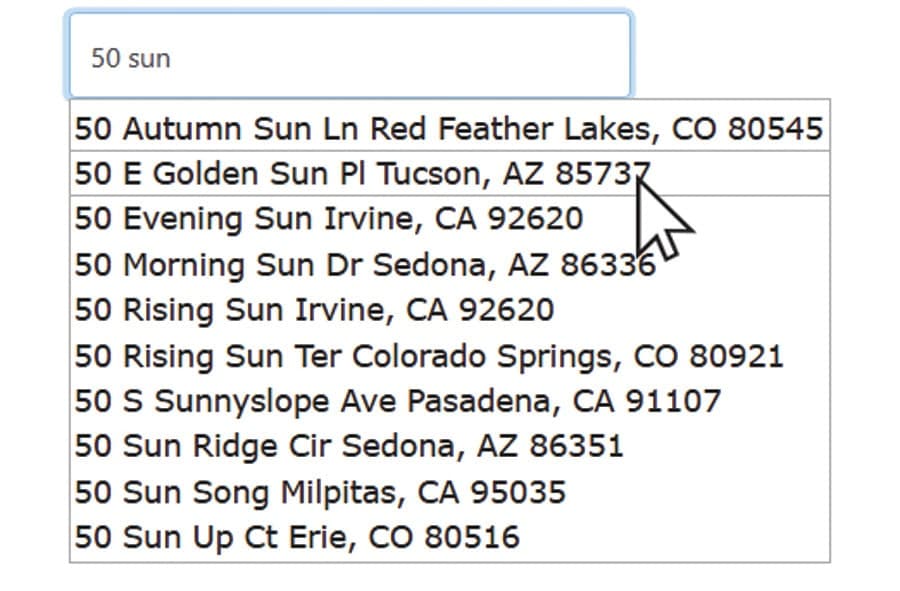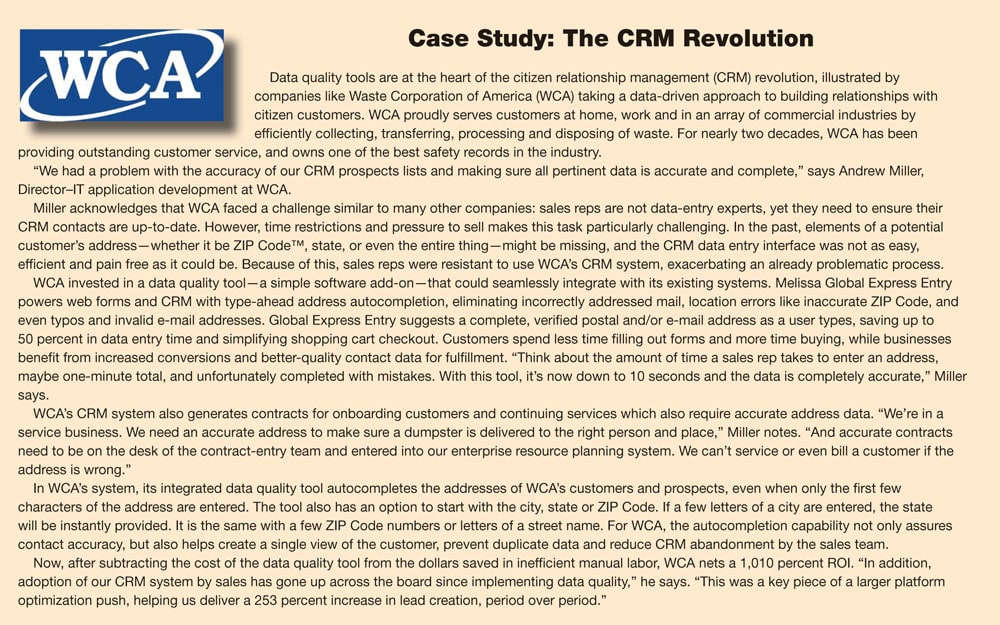A four-point strategy reduces operating costs and enhances waste management services.
By Greg Brown
Great customer service requires excellent information to help decision makers recognize challenges, set and meet goals, track success, and plan for the future. It is all about the data, and finding smarter options for managing, enhancing and connecting data points. This understanding is at the heart of successful municipal applications, serving citizens as valued customers and working to deliver exceptional services in the most economical way.
But this understanding is not easy to come by. The painful truth is that address data can be particularly difficult to keep complete and current. Is John Smith at 123 Main Street, the same customer as John Smythe at 123 Mein St.? Inconsistencies in data entry can create errors in customer outreach, and, if left unchecked, they can snowball into duplicate database entries. Also consider that municipal organizations, such as waste management companies, have many points of customer contact so they may be gathering the same addresses—and their many variations—numerous times. The problem of duplicate or similar entries gets even worse when records are stored in multiple, separate systems or databases.
While these data issues are a problem for direct marketers, they have a critical impact on companies that deliver vital services like garbage collection. Bad data perpetuates lost opportunities for service and support and wastes budget resources marketing to citizens at addresses that do not exist. A four-point strategy can solve this challenge, tapping into seamless data quality tools and techniques to address the mess, while reducing costs and improving services.
#1: Get Organized by Establishing a Master Address File
Complete a master address file for improved visualization, resource allocation and route planning. This ‘municipal-centric’ approach is an ideal way of validating, enhancing and managing addresses in a given neighborhood or area. These types of datasets are available for download or can be accessed via a simple API or software code that integrates easily into existing municipal platforms—and they contain current, detailed information on more than 180 million U.S. addresses, including residential, commercial and more than 2 million non-USPS® addresses, or physical addresses that do not receive USPS delivery.
Service providers can then complete an address reference set for their specific area of operations; this real-time database of residential and business addresses within a specific area benefits all data quality applications focused on activities other than mailing. Keep in mind that by including USPS and non-USPS addresses, service providers are accessing as many as 5 million addresses that can accept services yet have no regular mail delivery.
#2: Keep Your House in Order with One Master Record of Each Address
Keeping data organized means cleansing data consistently and continuously, matching entities, and assigning a unique and persistent identifier for each record. At the same time, updating this deep volume of data needs to be simplified and cost-effective. Persistent key technology has broken new ground here, and reduces time and resources spent on data updates by only updating keys that are new or have changed.
Persistent keys are also excellent for overall data management, tracking historical linkage of data as well as enabling easy enrichment, matching, and updating operations. Think of the key as a barcode or ISBN number, identifying a discrete physical street address and aligning a multitude of additional information associated with each particular address.
#3: Build Business by Unlocking New Potential with Smart Data Enhancements
For example, by adding location intelligence to addresses, waste management organizations have the ability to validate, enhance and manage addresses in a given neighborhood or area. Using the persistent key as an identifier, organizations can add and access geographic information such as rooftop lat./long. coordinates (geocoding), census tract/block number, county name and FIPS code—such enhancements are ideal for analytics, mapping, and logistics applications. Data can be searched based on specific parameters, like congressional districts, school districts, one or more ZIP CodeTM, or regions such as cities, counties or states.
Geocoding is just the beginning in terms of available data enhancements. Property files could include data such as shape, parcel size, altitude, building footprints, hazard risks, demographics and much more. For service providers, a more defined data fabric allows them to weave in smarter services at every step of the customer relationship, including geographic information system (GIS) mapping applications, smarter route planning, ongoing risk assessment, and analytics supporting budget evaluations and development of new service products.

#4: Keep Things Clean by Eliminating Bad Data at the Point of Data Entry
Ideally, only clean, verified data enters the system—making the point of data entry an important portal to apply smart and seamless data quality controls. Address auto-completion tools (simple web services that require no IT resources) can be easily integrated into web forms, online guest books or used internally for waste management staff collecting information from customers as they call for services. Addresses are validated as they are entered, with type-as-you-go data correction or fielded data that quickly recognizes and suggests correct addresses based on the ZIP Code provided. Data entry is not only correct, but also up to 50 percent faster, with less typing required from the citizen or the data entry staff.

Data Quality Cleans Up Citizen Relationship Management
As budgets are trimmed and services streamlined, the CRM focus is often lost in the shuffle, even as creating more effective connections with citizens has never been more important in the public sector. To do this, waste management agencies are building comprehensive profiles of each customer by aggregating data from disparate sources, resolving and matching identities, and enhancing records with data that can help improve interactions between citizens and their local agencies. This data-driven approach enables a better understanding of the customer, so service providers can focus on delivering the ‘right time, right message, right channel’ marketing inherent to a pleasant customer experience.
Effective citizen-centric marketing can only be achieved by having unprecedented visibility into the citizen. Today’s data quality tools empower this type of personalization-at-scale, allowing service providers to maximize their customers’ journey as municipal constituents. Not only are services handled more effectively (increasing profitability), but customers can also be treated with value—improving service, satisfaction and sales. | WA
Greg Brown is Vice President of Global Marketing at Melissa (Rancho Santa Margarita, CA), provider of global contact data quality and identity verification solutions that span the entire data quality lifecycle and integrate into CRM, e-commerce, master data management and Big Data platforms. He can be reached at [email protected] or through https://www.linkedin.com/in/gregorybr/.
